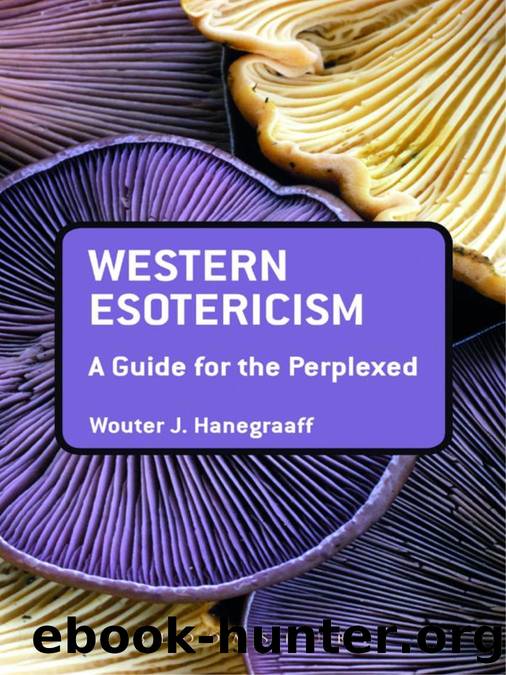Western Esotericism: a Guide for the Perplexed by Hanegraaff Wouter J.;

Author:Hanegraaff, Wouter J.;
Language: eng
Format: epub
Publisher: Bloomsbury Publishing Plc
Published: 2019-11-22T16:00:00+00:00
CHAPTER SIX
Practice
Religion is much more than belief. It is not just about holding certain worldviews, asserting to specific doctrinal propositions, or making claims about the true nature of reality. To a very large extent, religion is something that one does. People pray, go to church, meditate, take confession, light candles, listen to sermons, sing psalms or hymns, partake of the eucharist, practice penitence, study scripture, fight against unbelievers, celebrate religious holidays, go on pilgrimages, and so on and so forth. Doing certain things, and refusing to do certain other things, belongs to the very essence of what it means to be religious â regardless of whether one is very clear in oneâs own mind about the exact nature of oneâs beliefs, or oneâs reasons for holding them. Since esotericism is an integral part of religion in Western culture â while participating in domains such as philosophy and science as well â no overview can be complete unless it pays attention to its practical dimensions next to its worldviews and ways of gaining knowledge. What do people involved in esotericism actually do? Perhaps no other aspect of the field is so difficult to study and understand, for a whole number of reasons.
â¢First, there is the problem of sources. Because beliefs and convictions are usually written down at some point, information about them is transmitted to posterity much more easily and with more precision than information about practices. There is often no great need to describe religious practices in detail: in most cases, religious practitioners learn by oral instruction, daily experience or observation and imitation of âhow things are doneâ, and have little need of written reminders about what everybody already knows. As a result, we are usually better informed about religious or esoteric beliefs than about practices.
â¢Second, there is the problem of verbal description. Practices are inherently more difficult to describe than theories or doctrines. Even a simple ritual act is overdetermined with countless details that impinge on all the senses simultaneously, and hence even simple ceremonial procedures that are easily learned by observation and imitation are very difficult to capture in words. As a result, even if we have sources about esoteric practices, they tend to be incomplete.
â¢Third, there is the problem of (crypto)Protestant bias. Classical approaches to the study of religion have been heavily influenced by Protestant assumptions, including an implicit polemics against Roman Catholicism as crypto-âpaganâ practice,1 resulting in a structural over-emphasis on doctrine and belief and a corresponding lack of attention to ritual and other forms of practice.2 As a result, most scholars concentrate on the history of esoteric ideas or the study of esoteric discourse, while giving only scant attention to esoteric practice: even when they are studying contemporary currents first-hand, they often still tend to avoid engaging the relevant practices directly.
â¢Finally, there is the problem of method. Even if the importance of practice is acknowledged in principle, it is not easy to decide on appropriate methodologies for studying it. Anthropologists have built up much experience
Download
This site does not store any files on its server. We only index and link to content provided by other sites. Please contact the content providers to delete copyright contents if any and email us, we'll remove relevant links or contents immediately.
| Africa | Americas |
| Arctic & Antarctica | Asia |
| Australia & Oceania | Europe |
| Middle East | Russia |
| United States | World |
| Ancient Civilizations | Military |
| Historical Study & Educational Resources |
Machine Learning at Scale with H2O by Gregory Keys | David Whiting(3627)
Never by Ken Follett(3528)
Fairy Tale by Stephen King(2949)
The Man Who Died Twice by Richard Osman(2808)
Oathbringer (The Stormlight Archive, Book 3) by Brandon Sanderson(2630)
Will by Will Smith(2580)
Rationality by Steven Pinker(2149)
The Dark Hours by Michael Connelly(2076)
The Dawn of Everything: A New History of Humanity by David Graeber & David Wengrow(2017)
Can't Hurt Me: Master Your Mind and Defy the Odds - Clean Edition by David Goggins(2003)
Friends, Lovers, and the Big Terrible Thing by Matthew Perry(1992)
Principles for Dealing With the Changing World Order: Why Nations Succeed and Fail by Ray Dalio(1894)
HBR's 10 Must Reads 2022 by Harvard Business Review(1697)
A Short History of War by Jeremy Black(1669)
Go Tell the Bees That I Am Gone by Diana Gabaldon(1598)
515945210 by Unknown(1520)
443319537 by Unknown(1395)
Kingdom of Ash by Maas Sarah J(1386)
A Game of Thrones (The Illustrated Edition) by George R. R. Martin(1366)
